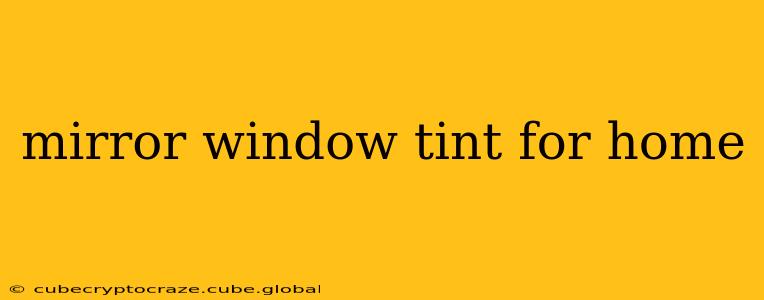Mirror window tint, also known as one-way mirror film, is a popular choice for homeowners seeking increased privacy while maintaining natural light. This innovative film offers a sleek, modern aesthetic and can significantly impact the look and feel of your home. But before you commit, understanding the nuances of mirror window tint is key. This comprehensive guide will explore its benefits, drawbacks, and everything you need to know before installation.
What is Mirror Window Tint?
Mirror window tint is a specialized film applied to the interior of your windows. During the day, the mirrored effect allows you to see out while making it difficult for others outside to see in. At night, however, when interior lighting surpasses exterior illumination, this effect reverses, and visibility from outside becomes clearer. This is a crucial point to consider, especially for ground-floor windows or those facing well-lit areas. The film itself is typically made of a polyester base coated with metallic layers creating the reflective surface. The quality and thickness of these layers determine the tint's effectiveness and durability.
How Does Mirror Window Tint Work?
The "mirror" effect relies on the principle of light reflection. During the day, more light enters from outside than leaves from inside, resulting in a greater reflection outward, hence the mirrored appearance from the outside. At night, the reverse happens: Interior lights make it easier for outside viewers to see in. Think of it like a one-way mirror in a police interrogation room—the principle is similar, though the degree of visibility depends on lighting conditions and the tint's quality.
Benefits of Using Mirror Window Tint
-
Enhanced Privacy: This is the primary benefit. Mirror window tint significantly reduces visibility into your home, offering a much-needed sense of security and seclusion, particularly in densely populated areas or those with street-facing windows.
-
UV Protection: Many mirror window tints offer UV protection, shielding your furniture and flooring from sun damage and fading. This can extend the lifespan of your interior décor and protect your skin from harmful UV rays.
-
Heat Reduction: Depending on the film's construction, mirror window tint can help reduce heat entering your home, minimizing reliance on air conditioning and potentially lowering energy bills.
-
Glare Reduction: The reflective properties of mirror window tint also reduce glare from the sun, enhancing comfort and improving visibility inside your home.
-
Stylish Appearance: Mirror window tint adds a contemporary and sleek look to your windows, enhancing the aesthetic appeal of your home.
Drawbacks of Mirror Window Tint
-
Nighttime Visibility: As mentioned before, the mirrored effect diminishes at night. If privacy is paramount at all times, consider other options or supplement with curtains or blinds.
-
Installation Challenges: Improper installation can result in bubbles, wrinkles, or peeling, detracting from the aesthetic appeal and potentially compromising its effectiveness. Professional installation is often recommended.
-
Limited Light Transmission: While it lets in natural light, the tint does reduce the amount of light compared to untinted windows. This could be a factor for rooms needing maximum illumination.
-
Cost: Mirror window tint can be more expensive than other window film options.
What are the Different Types of Mirror Window Tint?
Mirror window tints vary in their reflectivity, light transmission, and UV protection capabilities. Some offer a darker, more reflective surface, while others provide a lighter, more transparent appearance. The choice depends on individual preferences and needs. Consult with a window film professional for assistance in choosing the right type for your home.
How Much Does Mirror Window Tint Cost?
The cost of mirror window tint varies greatly depending on the size of the windows, the type of film used, and whether you opt for professional installation. Getting multiple quotes from reputable installers is crucial to find the best value for your needs.
How Long Does Mirror Window Tint Last?
The lifespan of mirror window tint depends on factors such as the quality of the film, the installation, and environmental conditions. High-quality films can last for several years, even decades, with proper care and maintenance.
Can I Install Mirror Window Tint Myself?
While DIY installation is possible, it's generally recommended to hire a professional. Improper installation can lead to poor results, including bubbles, wrinkles, and premature failure. Professional installers have the experience and tools to ensure a flawless application.
Is Mirror Window Tint Legal?
The legality of mirror window tint can vary depending on local ordinances. Some jurisdictions may restrict the level of reflectivity or light transmission allowed for window films. Checking with your local authorities before installation is recommended.
In conclusion, mirror window tint offers a blend of style, functionality, and privacy enhancement for your home. However, understanding its limitations and making an informed choice based on your specific needs and local regulations is essential. Remember to weigh the benefits and drawbacks carefully before making a decision.
